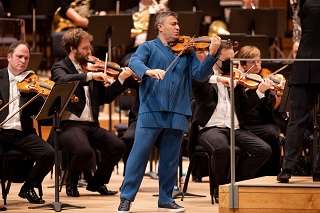|
Back
Andrey Boreyko Delights with Die Seejungfrau Montreal
Maison symphonique de Montréal, Place des Arts
01/18/2023 - & January 19, 2023
Richard Wagner: Tannhäuser: Overture
Max Bruch: Violin Concerto No. 1 in G minor, op. 26
Alexander von Zemlinsky: Die Seejungfrau
Maxim Vengerov (Violin)
Orchestre symphonique de Montréal, Andrey Boreyko (Conductor)

(© Antoine Saito)
What a treat it was to hear Alexander von Zemlinsky’s late Romantic masterpiece Die Seejungfrau (The Mermaid) performed by the Orchestre symphonique de Montréal (OSM). At the helm, guest conductor Andrey Boreyko, Music and Artistic Director of the Warsaw Philharmonic Orchestra, delivered a stellar performance. (Boreyko was replacing Nikolaj Szeps‑Znaider who withdrew from this week’s concerts for reasons of health.)
Based on the Hans Christian Andersen fairy tale (a bronze statue of the Little Mermaid on Copenhagen’s waterfront is a famous icon), the 45‑minute symphonic poem depicts the story of a mermaid who rescues a prince from a storm at sea and subsequently falls in love with him. But the prince fails to realise it was the mermaid who saved him and marries someone else. The distraught mermaid, torn between the desire to kill him or return to the sea, chooses her own death by disintegrating in the ocean. Die Seejungfrau had only a few performances upon its completion in 1903, after which the first movement was given to the librettist Marie Pappenheim (of Erwartung fame) while Zemlinsky took the two remaining movements with him when he fled to New York City in 1938. Lost for decades, the parts were only reassembled by musicologists during the 1980s.
With little body motion, Boreyko maintained sure control of the augmented orchestra (including six horns and four trombones), paying meticulous attention to the details of the score and bringing out the best from the individual soloists and sections. Entries were clean and precise, sections well balanced, with lush harmonies and orchestral colors much in evidence. Concertmaster Andrew Wan’s extensive solo work, which depicts the mermaid, was faultless throughout. The storm scene was powerful without being overpowering, and the mermaid dissolving in the ocean was handled with great sensitivity. The two harps added a touch of grace.
No less impressive was Maxim Vengerov’s rendition of Max Bruch’s First Violin Concerto, one of the masterpieces of the Romantic violin repertory. Premiered in 1868 by Joseph Joachim (who assisted in its composition), it became so popular and performed so often that Bruch ended up hating the work. Although he wrote symphonies, operas and chamber works, his First Concerto, apart from Kol Nidre and the Scottish Fantasy, is his only work regularly performed. Resplendent in royal blue and matching trainers, Vengerov delivered a lovingly rendered performance. His technique and dexterity, especially with the treacherous quadruple stopping in the final movement, was impeccable (as it was when he recorded the work for Telarc 30 years ago!). Vengerov brought out the deep and dark richness of the main theme of the middle movement and dazzled with the Hungarian folk themes of the third. After thanking the audience and orchestra in impeccable French, he performed a finely honed Sarabande from Bach’s Partita No. 2 in D minor.
The concert opened with a stately but well‑shaped performance of Wagner’s Overture to Tannhäuser. Boreyko, however, allowed the violins to overpower the lower strings and although the horn entries were spot on, they seemed to play with a lack of confidence and verve.
Earl Arthur Love
|